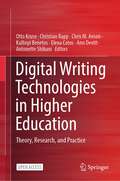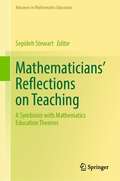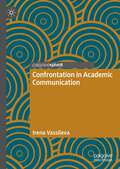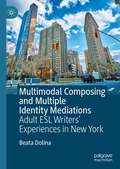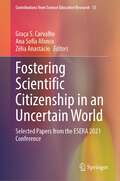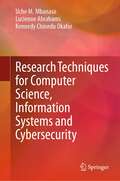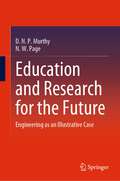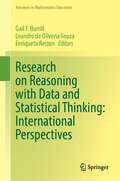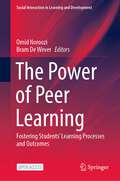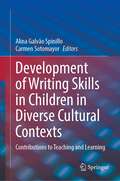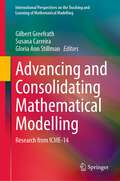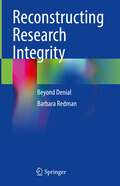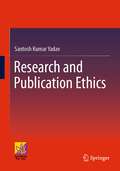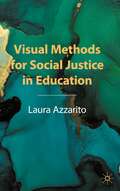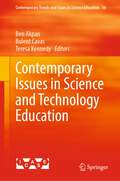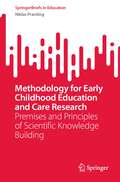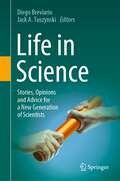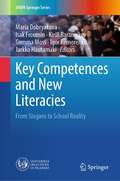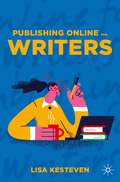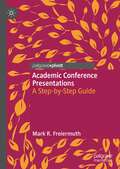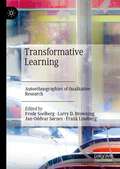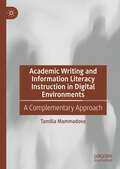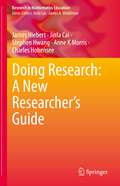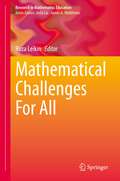- Table View
- List View
Digital Writing Technologies in Higher Education: Theory, Research, and Practice
by Otto Kruse Christian Rapp Chris M. Anson Kalliopi Benetos Elena Cotos Ann Devitt Antonette ShibaniThis open access book serves as a comprehensive guide to digital writing technology, featuring contributions from over 20 renowned researchers from various disciplines around the world. The book is designed to provide a state-of-the-art synthesis of the developments in digital writing in higher education, making it an essential resource for anyone interested in this rapidly evolving field.In the first part of the book, the authors offer an overview of the impact that digitalization has had on writing, covering more than 25 key technological innovations and their implications for writing practices and pedagogical uses. Drawing on these chapters, the second part of the book explores the theoretical underpinnings of digital writing technology such as writing and learning, writing quality, formulation support, writing and thinking, and writing processes. The authors provide insightful analysis on the impact of these developments and offer valuable insights into the future of writing. Overall, this book provides a cohesive and consistent theoretical view of the new realities of digital writing, complementing existing literature on the digitalization of writing. It is an essential resource for scholars, educators, and practitioners interested in the intersection of technology and writing.
Mathematicians' Reflections on Teaching: A Symbiosis with Mathematics Education Theories (Advances in Mathematics Education)
by Sepideh StewartThis book opens the case on collaboration among mathematicians and mathematics educators. The authors of this book provide their research and experience based insights on collaboration to inspire the young generation of the mathematics community to engage in productive collaborations and exchange of knowledge early in their careers. These valuable collaborations are anticipated to generate innovative research questions that set new and novel paths for mathematics education research with ample possibilities yet to be realized and discovered.
Confrontation in Academic Communication
by Irena VassilevaThis book examines the argumentation strategies employed by linguists in voicing criticism, looks for explanations for confrontation in academic discourse, and evaluates the positive and/or negative effects it has on international academic communication. Issues such as the role of intertextuality, cross-cultural variations, and the notion of “academic discourse community” are also touched upon. Special attention is paid to the modern developments in contrastive rhetoric studies, as well as to the controversial issue of the use of context-based versus corpus-based methods. The corpus under investigation consists of academic book reviews in English and German with a clearly stated negative character, as well as a series of publications in English interrelated by the fact that they discuss a common group of problems but from two fully confrontative points of view. They illustrate what has been called an “academic war”. Some related theoretical issues are also discussed, including the role of evaluation in academic communication, the relationship between criticism, critique, negative evaluation, and confrontation in academic communication, as well as the importance of culture, discipline culture, and communities of practice. The contrastive discourse analysis demonstrates differences between English and German in terms of the rhetorical strategies employed by review writers to express criticism. The book will be of interest to researchers in the fields of academic communication and rhetorics, as well as teachers in English/German for academic purposes.
Multimodal Composing and Multiple Identity Mediations: Adult ESL Writers' Experiences in New York
by Beata DolinaThis book examines the experiences of adult ESL (English as a Second Language) learners in New York, paying particular attention to the relationship between their professional identities and multimodal composing practices in English classroom. The author uses an (auto-)ethnographic framework to investigate how previously-constructed identities of a professional nature aided the students in the design of multimodal texts including photographs and written material in English. This small-scale study is contextualised in relation to current research in the fields of multimodality, identity construction and teaching methodology, and the author also draws on Kress' theory of visual semiotics. Finally, the book provides detailed descriptions and suggestions for multimodal lessons which could be delivered in ESL classrooms in other settings, including multimodal roleplays, theatre games, and model discussion questions and answers. This book will be of interest to ESL/EFL and TESOL researchers and practitioners, as well as pre-service teachers and MA TESOL students.
Fostering Scientific Citizenship in an Uncertain World: Selected Papers from the ESERA 2021 Conference (Contributions from Science Education Research #13)
by Graça S. Carvalho Ana Sofia Afonso Zélia AnastácioThis edited volume brings together innovative research in the field of Science Education, fostering scientific citizenship in an uncertain world. The nineteen chapters presented in this book address diverse topics, and research approaches carried out in various contexts and settings worldwide, contributing to improving and updating knowledge on science education. The book consists of selected high-quality studies presented at the 14th European Science Education Research Association (ESERA) Conference, held online (due to the Covid-19 pandemic) by the University of Minho, Portugal, between August 30th and September 3rd, 2021. Being of great relevance in contemporary science education, this book stimulates reflection on different approaches to enhance a deeper understanding of how better prepare the coming generations, which is of great interest to science education researchers and science teachers.
Research Techniques for Computer Science, Information Systems and Cybersecurity
by Uche M. Mbanaso Lucienne Abrahams Kennedy Chinedu OkaforThis book introduces impact-driven research paths in computer science, information systems and cybersecurity with practical insights, effective instructions, and examples. The book takes the students through the full cycle of research until the point of submission and evaluation. The book begins by providing postgraduate research students with the foundational concepts and techniques to simplify the complexities associated with choosing topics in the computer science (CS), information systems (IS) and cybersecurity (CY) research domains. The authors furnish readers with fundamentals that facilitate active quantitative, qualitative, and mixed methods research enquiries. The content offers important perspectives on how to think about deepening research in CS, IS and CY, noting that these subjects can be studied from computational sciences, engineering sciences, health sciences, social sciences, or interdisciplinary perspectives. This unique and contemporary book aims to benefit researchers, graduate students and engineers in the fields of computer science, information systems and cybersecurity in particular, in addition to other engineering and technology disciplines.ctives on how to think about deepening research in CS, IS and CY, noting that these subjects can be studied from computational sciences, engineering sciences, health sciences, social sciences, or interdisciplinary perspectives. This unique and contemporary book aims to benefit researchers, graduate students and engineers in the fields of computer science, information systems and cybersecurity in particular, in addition to other engineering and technology disciplines.ctives on how to think about deepening research in CS, IS and CY, noting that these subjects can be studied from computational sciences, engineering sciences, health sciences, social sciences, or interdisciplinary perspectives. This unique and contemporary book aims to benefit researchers, graduate students and engineers in the fields of computer science, information systems and cybersecurity in particular, in addition to other engineering and technology disciplines.ctives on how to think about deepening research in CS, IS and CY, noting that these subjects can be studied from computational sciences, engineering sciences, health sciences, social sciences, or interdisciplinary perspectives. This unique and contemporary book aims to benefit researchers, graduate students and engineers in the fields of computer science, information systems and cybersecurity in particular, in addition to other engineering and technology disciplines.ctives on how to think about deepening research in CS, IS and CY, noting that these subjects can be studied from computational sciences, engineering sciences, health sciences, social sciences, or interdisciplinary perspectives. This unique and contemporary book aims to benefit researchers, graduate students and engineers in the fields of computer science, information systems and cybersecurity in particular, in addition to other engineering and technology disciplines.ctives on how to think about deepening research in CS, IS and CY, noting that these subjects can be studied from computational sciences, engineering sciences, health sciences, social sciences, or interdisciplinary perspectives. This unique and contemporary book aims to benefit researchers, graduate students and engineers in the fields of computer science, information systems and cybersecurity in particular, in addition to other engineering and technology disciplines.
Education and Research for the Future: Engineering as an Illustrative Case
by D. N. Murthy N. W. PageThis book takes a fresh look at the fundamental character of education, its history, interaction with society, purpose, changing focus over time and interactions with technology. It surveys the role of research in increasing the body of knowledge leading to new technologies that have helped serve the needs of humankind.In our lifetime there have been profound changes to the world we live in; the technologies used, the problems we struggle with, and the education systems intended to prepare this and following generations for the future. Many of the problems we face now are more complex than in earlier times, requiring broadly based approaches our traditional silo specialisations are ill-prepared to deal with. They involve technologies whose range of positive and negative effects are not well understood. Many of these problems are global in nature and can no longer be treated just as local issues. Our current approach to education does not adequately prepare us to tackle these problems.New approaches to education are needed to prepare us for the changes that are to come. The future of our planet, our civilisation, our community and our economy depend on it. This book proposes changes that will better prepare us for this future.
Research on Reasoning with Data and Statistical Thinking: International Perspectives (Advances in Mathematics Education)
by Gail F. Burrill Leandro de Oliveria Souza Enriqueta RestonThis book is derived from selected papers from the Fourteenth International Congress on Mathematical Education Topic Study Group 12, Teaching and Learning Statistics. It describes recent research on curriculum, pedagogy and outreach initiatives from countries as diverse as Brazil, Chile, Columbia, Denmark, Germany, the Netherlands, Spain, Sweden, Thailand, Turkey, the United Kingdom, and the United States. The book has a focus on the use of data in the teaching and learning of statistics across grade levels and begins with an overview of the status of statistics education and the use of data from seven different countries across the continents and the link between research and practice in those countries. Because it contains specific examples of the research, for example, on the ways children learn, the choice and implementation of tasks, or the role of informal inference, the book will be a great resource to those interested and involved in the teaching of statistics, curriculum developers, and statistics education researchers.
The Power of Peer Learning: Fostering Students’ Learning Processes and Outcomes (Social Interaction in Learning and Development)
by Omid Noroozi Bram De WeverThis open access book explores new developments in various aspects of peer learning processes and outcomes. It brings together research studies examining how peer feedback, peer assessment, and small group learning activities can be designed to maximize learning outcomes in higher, but also secondary, education.Conceptual models and methodological frameworks are presented to guide teachers and educational designers for successful implementation of peer learning activities with the hope of maximizing the effectiveness of peer learning in real educational classrooms.There is a strong emphasis on how technology-enhanced tools can advance peer learning, both with respect to designing and implementing learning activities, as well as analyzing learning processes and outcomes.By providing empirical studies from different peer learning initiatives, both teachers and students in academic and professional contexts are informed about the state of the art developments of peer learning.This book contributes to the understanding of peer learning challenges and solutions in all level of education and provide avenues for future research. It includes theoretical, methodological, and empirical chapters which makes it a useful tool for both teaching and research.
Development of Writing Skills in Children in Diverse Cultural Contexts: Contributions to Teaching and Learning
by Alina Galvão Spinillo Carmen SotomayorThis book brings together multiple theoretical perspectives and disciplinary approaches to study the acquisition and development of written language by children as well as the implications for teaching and learning of writing practices in a variety of languages and cultural contexts. Chapters in this contributed volume present both theoretical contributions and results of research carried out with students and teachers from 11 countries (Belgium, Brazil, Chile, Israel, Italy, Mexico, the Netherlands, Portugal, Spain, UK and USA) who speak seven different languages: Portuguese, Spanish, English, Italian, French, Dutch and Hebrew. By bringing together research developed in diverse cultural contexts it enriches the debates in the interdisciplinary field of writing studies by analyzing a wide range of topics at the interface between research and educational implications for the teaching and learning of writing by children. The book consists of five parts, each one addressing a specific set of topics. Part I presents studies on topics related to written language representation systems (phonological and morphological awareness) and on the relationship between grammar and the quality of texts of different genres. Part II includes studies related to compositional processes of writing texts, and the factors involved in these processes. Part III focuses on the difficulties faced by students during the acquisition and development of writing. Part IV is dedicated to chapters that discuss and compare writing practices in different social environments. Finally, chapters in part V deal with teaching and learning of writing in the school setting. Development of Writing Skills in Children in Diverse Cultural Contexts: Contributions to Teaching and Learning will be of interest to researchers and students in the fields of psychology, education and linguistics, as well as to other social scientists in the broader interdisciplinary field of writing studies.
Advancing and Consolidating Mathematical Modelling: Research from ICME-14 (International Perspectives on the Teaching and Learning of Mathematical Modelling)
by Gilbert Greefrath Susana Carreira Gloria Ann StillmanThis edited volume presents applications and modelling as a world-renowned sub-field of research in mathematics education. It includes the discussion on students’ development of modelling competency through the teaching of applications and modelling. The teaching of mathematical modelling is considered from different perspectives, such as mathematical, pedagogical-didactical perspectives and critical-societal or socio-political perspectives. Assessment practices (local, regional or international) of modelling activities and difficulties with modelling activities at school and university levels, respectively, are discussed. Use of technology and other resources in modelling activities and their impact on the modelling processes are included in the considerations. Teaching practices, teacher education and professional development programs concerning the integration of applications and modelling in school and university mathematics programs are developed in this context.
Reconstructing Research Integrity: Beyond Denial
by Barbara RedmanThis book exposes significant threats to research integrity and identifies policies and practices that can reverse these trends. It is focused on human research and US policy. Recent assessments have shown inadequacies in institutions, policies, and practices that seriously compromise ethics. The presumed self-regulatory nature of the scientific endeavor has been exposed to have allowed unabated areas of poor-quality science, an incomplete and inaccessible scientific record, conflicts of interest, differing notions of accountability, virtually no evidence base to direct research integrity policy, and a growing sense of alienation, moral injury and even revolt among scientists. Reconstructing Research Integrity aims to capture ways of vigorously moving toward scientific and ethical rigor, including self-correction and emerging or already-successful initiatives. The book begins with analysis of the full system of institutions, policies, and practices involved in production, dissemination, and application of research, including an examination of the blind spots in research ethics ideology, policy, and practice. The book then identifies policies and practices that can reverse harmful ethical trends, such as strengthening Responsible Conduct of Research (RCR) training and improving self-regulation in the scientific community. Finally, the book discusses the constant evolution of research ethics and integrity, which is illustrated by emerging research fields like gene editing and data science. This book will be of interest to all research administrators in academic, commercial and government positions; to policy advisors at the National Science Foundation and at the National Academies of Science, Engineering, and Medicine; to graduate students in research ethics; to advanced bioethics education programs across the globe; and to researchers and consultants in ELSI (ethical, legal, and social implications) programs.
Research and Publication Ethics
by Santosh Kumar YadavThis textbook aims to provide awareness about research ethics, misconduct and the ensuing actions as per international law, information on open access publishing and predatory publishing. Many fresh research scholars are not fully acquainted with the rules governing copyright infringements, plagiarism and intellectual property rights. As such the book presents its various features in a lucid style, and the latest updates on the use of information technology in retrieving and managing information through various means in an ethical manner. The book is useful for students, young researchers and professionals.
Visual Methods for Social Justice in Education
by Laura AzzaritoThis book makes a case for the usefulness of visual research methods for advancing a social justice agenda in education. The author aims to provide education researchers with a wide range of qualitative visual research tools to invoke different stories, voices, embodiments, and experiences of individuals from marginalized communities; to advance emancipatory research projects; to embrace interdisciplinary knowledge-building; and to counter-narrate Western forms of knowledge, cultures, and values for the reimagining of education for social change. It draws attention to the importance of visual methods in today’s neoliberal landscape of education to speak back to mainstream research and practices, especially when research participants lack words to describe, express, and represent what it means to be impacted by oppression and marginalization.
Systemic Cognition and Education: Empowering Students for Excellence in Life
by Ibrahim A. HallounThis book offers pedagogic and governance foundations and guidelines for systemic education. It provides an overall systems-based picture of what formal education should be about, and of how things should be carried out in practice, in order to empower students – and teachers – for success in life. It transcends traditional disciplinary education, showing how systemic, praxis immersive, convergence education (SPICE) produces graduates who know how to think outside the box and excel in practical real-life situations. Drawing on philosophy, cognition, and the latest developments in neuroscience, the book calls for systemic pedagogical frameworks that allow for different curricula to be coherently and efficiently designed, and consistently and systematically deployed across different disciplines and various grade levels in the context of mind-and-brain based experiential learning ecologies.This volume is a major design and practice reference for school teachers, university professors, graduate students, along with interested educators, educationists, and stakeholders in various sectors of society.
Contemporary Issues in Science and Technology Education (Contemporary Trends and Issues in Science Education #56)
by Ben Akpan Bulent Cavas Teresa KennedyThis edited volume discusses major issues in present-day science and technology education (STE). It is divided into three thematic sections: philosophical foundations and curriculum development; sustainable development, technology and society; and the learning sciences and 21st century skills. Section I examines the history and future of STE curriculum development, along with specific issues within this dynamic area. Section II explores sustainable development in three important aspects: economic development, social development, and environmental protection. Section III covers the 21st century skills that are of overarching importance to the success of learners in school and the world of work. Anchoring each chapter is an assemblage of veteran science and technology education specialists selected from across the world. The book’s target is a worldwide audience of undergraduate / post-graduate students and their teachers, as well as researchers. This book’s exploration of the ever-increasing advances in STE and its narrative writing style will be of interest to a broad range of readers.
Methodology for Early Childhood Education and Care Research: Premises and Principles of Scientific Knowledge Building (SpringerBriefs in Education)
by Niklas PramlingThis book concisely explores the distinguishing features of scientific knowledge and research in early childhood education and care (ECEC). It has a dual-level focus of containing and relating the concrete practices of conducting research with the more fundamental conceptual discussions around research – the Bildung of the researcher.The book introduces and succinctly explains the concepts of methodology, theoretical knowledge about method, and how all parts of conducting research are informed by theory. The interrelation of these concepts, and many premises of research, are often regarded as assumed knowledge. In this book, premises of research are explicated and discussed, as well as methods on how to engage in informed dialogue.This introductory text explicates many features of scientific knowing and knowledge building in ECEC that tend to be presumed rather than clarified. It will be important in furthering the professional development of PhD students, Master’s students, supervisors, and researchers.
Life in Science: Stories, Opinions and Advice for a New Generation of Scientists
by Diego Breviario Jack A. TuszynskiThis book is a collection of stories, reflections and advice written by proficient scientists. They address the question of what doing science means to them, and describe attitudes and working practices that have proved effective and rewarding. The book is aimed in particular at young people who are attracted by science or already undertaking undergraduate studies, and who are considering making science their long-term profession. It will also be helpful and revealing to early-career scientists who are searching for their own best route to success. The book serves as a platform for experienced scientists to describe their original inclination, how that subjective disposition found its expression in their way of doing science, whether their expectations were met, and what achievements they can claim. But it is not restricted to success: contributors also share details of the limitations and failures they have encountered. Last but not least they describe how they see science now, how they think it will be in the near future, and what advice they would give to the their much younger colleagues. Readers will appreciate the diversity of the individual paths shaped by different education, motivation, ambition, inclination, intuition, feeling, belief and eligibility. At the same time the stories confirm that science relies on a translation of this subjective level into an objective level, one that is shared and accepted by the international scientific community, and whose results are produced with a commonly accepted and fully rational scientific method of investigation.
Key Competences and New Literacies: From Slogans to School Reality (UNIPA Springer Series)
by Maria Dobryakova Isak Froumin Kirill Barannikov Gemma Moss Igor Remorenko Jarkko HautamäkiThis edited book is a unique comprehensive discussion of 21st century skills in education in a comparative perspective. It presents investigation on how eight very different countries (China, Canada, England, Finland, Poland, South Korea, the USA and Russia) have attempted to integrate key competences and new literacies into their curricula and balance them with the acquisition of disciplinary knowledge. Bringing together psychological, sociological, pedagogical approaches, the book also explores theoretical underpinnings of 21st century skills and offers a scalable solution to align multiple competency and literacy frameworks. The book provides a conceptual framework for curriculum reform and transformation of school practice designed to ensure that every school graduate thrives in our technologically and culturally changing world. By providing eight empirical portraits of competence-driven curriculum reform, this book is great resource to educational researchers and policy makers.
Publishing Online for Writers
by Lisa KestevenPublishing online can be a daunting prospect for any writer. This book equips aspiring writers with a range of practical skills and tactics for entering the online publishing world. It will guide readers on where and how to publish online, whether writing for magazines, journals, blogs, or podcasts. The textbook includes practical exercises for developing skills such as producing an e-book, creating an e-book marketing strategy, and building an online writer’s presence.It also features step-by-step guides, examples and checklists that help readers research and find appropriate sites to submit work to, and show how to take a completed manuscript through to publication. This textbook will appeal to students, freelance writers, creative writers, poets, novelists and anyone interested in publishing content online to promote and sell their work more effectively.
Academic Conference Presentations: A Step-by-Step Guide
by Mark R. FreiermuthThis book provides a step-by-step journey to giving a successful academic conference presentation, taking readers through all of the potential steps along the way—from the initial idea and the abstract submission all the way up to the presentation itself. Drawing on the author's own experiences, the book highlights good and bad practices while explaining each introduced feature in a very accessible style. It provides tips on a wide range of issues such as writing up an abstract, choosing the right conference, negotiating group presentations, giving a poster presentation, what to include in a good presentation, conference proceedings and presenting at virtual or hybrid events. This book will be of particular interest to graduate students, early-career researchers and non-native speakers of English, as well as students and scholars who are interested in English for Academic Purposes, Applied Linguistics, Communication Studies and generally speaking, most of the Social Sciences. With that said, because of the book’s theme, many of the principles included within will appeal to broad spectrum of academic disciplines.
Transformative Learning: Autoethnographies of Qualitative Research
by Frode Soelberg Larry D. Browning Jan-Oddvar Sørnes Frank LindbergThis book contains a series of autoethnographies written by participants of a program on qualitative methods. It offers the stories of students-turned-professors and what they learned via autoethnographic writing as part of the course. The chapters provide insight into the application of a range of qualitative research techniques and, unlike typical works on qualitative methods, in a nonprescriptive method that reflects a personal learning process. This book will be of interest to students and academics engaged in qualitative research, as well as scholars of transformative learning, teaching pedagogy and broader educational studies.
Academic Writing and Information Literacy Instruction in Digital Environments: A Complementary Approach
by Tamilla MammadovaThis book offers an interdisciplinary approach to the teaching of academic writing and information literacy in a new digital dimension, drawing on recent trends towards project-based writing, digital writing and multimodal writing in Education, and synthesising theory with practice to provide a handy toolkit for teachers and researchers. The author combines a practical orientation to teaching academic writing and information literacy with a grounding in current theories of writing instruction in the digitalized era, and argue that as digital environments become more universal in modern society - particularly in the aftermath of the coronavirus pandemic - the lines between traditional academic writing and multi-modal digital writing must necessary become blurred. This book will be of use to teachers and instructors of academic writing and information literacy, particularly within the context of English for Academic Purposes (EAP), as well as students and researchers in Applied Linguistics, Pedagogy and Digital Writing.
Doing Research: A New Researcher’s Guide (Research in Mathematics Education)
by James Hiebert Jinfa Cai Stephen Hwang Anne K Morris Charles HohenseeThis book is about scientific inquiry. Designed for early and mid-career researchers, it is a practical manual for conducting and communicating high-quality research in (mathematics) education. Based on the authors’ extensive experience as researchers, as mentors, and as members of the editorial team for the Journal for Research in Mathematics Education (JRME), this book directly speaks to researchers and their communities about each phase of the process for conceptualizing, conducting, and communicating high-quality research in (mathematics) education.In the late 2010s, both JRME and Educational Studies in Mathematics celebrated 50 years of publishing high-quality research in mathematics education. Many advances in the field have occurred since the establishment of these journals, and these anniversaries marked a milestone in research in mathematics education. Indeed, fifty years represents a small step for human history but a giant leap for mathematics education. The educational research community in general (and the mathematics education community in particular) has strongly advocated for original research, placing great emphasis on building knowledge and capacity in the field. Because it is an interdisciplinary field, mathematics education has integrated means and methods for scientific inquiry from multiple disciplines. Now that the field is gaining maturity, it is a good time to take a step back and systematically consider how mathematics education researchers can engage in significant, impactful scientific inquiry.
Mathematical Challenges For All (Research in Mathematics Education)
by Roza LeikinThis book argues that mathematical challenge can be found at any level and at every age and constitutes an essential characteristic of any mathematics classroom aimed at developing the students’ mathematical knowledge and skills. Since each mathematics classroom is heterogeneous with respect to students’ mathematical potential, quality mathematical instruction results from matching the level of mathematical challenge to different students’ potential. Thus, effective integration of mathematical challenge in the instructional process is strongly connected to the equity principle of mathematics education. In the three sections in this volume readers can find diverse views on mathematical challenges in curriculum and instructional design, kinds and variation of mathematically challenging tasks and collections of mathematical problems. Evidence-based analysis is interwoven with theoretical positions expressed by the authors of the chapters. Cognitive, social and affective characteristics of challenging mathematical activities are observed and analyzed. The volume opens new avenues of research in mathematics education, and pose multiple questions about mathematical instruction rich in mathematical challenge for all. The authors invite readers to explore and enjoy mathematical challenges at different levels.
